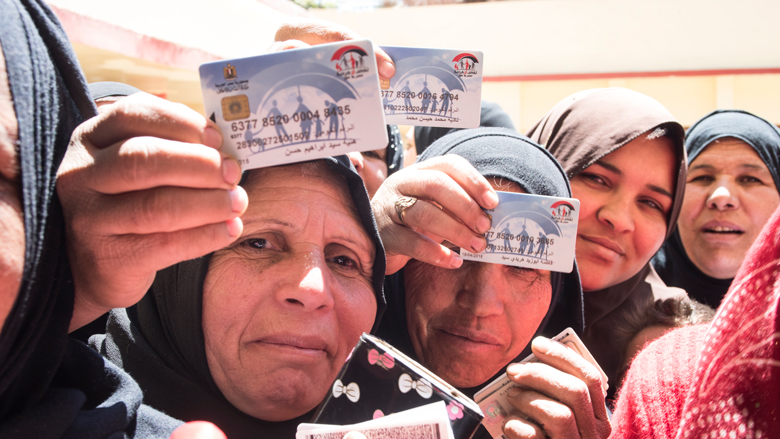Amidst the general volatile context of the last decade, women had their own specific share of pressures and frustrations. Mothers around the country from the most vulnerable populations were responsible for their children’s wellbeing and education yet lacked the required awareness and financial resources. The mothers depending on their husbands felt even more frustrated and disempowered as they were forced to make ends meet with the minimal amounts they were given and were often denied the right to make decisions regarding household purchases.
‘’As soon as I heard of the program, I went and applied as the cash transfer could help us in many areas of life, especially the education of our daughters,’’ said Sabreya, from Marsa Matrouh. Her daughter agreed. “’I think everyone should get an education and no one should stay at home,” she says. “Here they fear that if a girl leaves her home to go to school [..she may be] in danger. But this is not true, the police are keeping everyone safe and the amount of people going to school is increasing.’’ But in addition to education access, Sabreya mentioned how she was able to save enough to buy a goat and pigeons to support her family. “I am very grateful for that. At times when I don’t have work, I sell the meat or poultry. It’s a good project.’’
Takaful and Karama was launched one year after Egypt embarked upon its bold economic reform program aimed at stabilizing the economy, creating jobs, and achieving sustainable growth. Although Egypt is slowly beginning to reap the benefits of this program, vulnerable citizens have suffered from the reforms’ negative short-term impacts such as price hikes.
To support the Egyptian government in mitigating the reforms’ negative short-term effects, the World Bank financed US$400 million for the Takaful and Karama operation in 2015. The Takaful part of the program transfers 325 Egyptian Pounds conditionally to households, providing they are compliant with certain, clearly defined requirements, such as all household children ages 6 to 18 have at least an 80% school attendance record, mothers, and children below age 6, visit health clinics four times a year, and other requisites like child growth monitoring records.
‘’Through the Takaful pension, I was able to begin my small baking business at home. I bought two sacks of flour and started baking bread. People come and buy bread from me so I don’t need to leave my house,’’ said Sabah, a woman from Qena, Upper Egypt.
But apart from covering 10% of Egypt’s overall population, a recent independent impact evaluation conducted by the International Food Policy Research Institute (IFPRI) shows that Takaful had many impressive effects on women empowerment and economic inclusion such as:
- An increase in intra-household decision making power, since the transfer is targeted to women
- An increase in the female recipients’ self-esteem and confidence due to the cash ownership
- Less arguments induced by financial stress, and accordingly less domestic violence, translating to a more stable upbringing atmosphere for the children
- A sense of empowerment and hope due to the secondary results of their children receiving education and better access to nutrition and health
- Increased financial inclusion through the Smart Cards, which encouraged women to open bank accounts, have savings, and access more credit
- Improved consumption and nutrition, leading to improved health outcomes - beneficiaries are able to buy meat, chicken, fruits and vegetables, to ensure their children have a better chance at a prosperous and productive life
Om Tarek, a program participant from Halayeb, Red Sea Governorate is another person who was excited at being in charge of the money. “It is great that the transfers are issued in the woman’s name. Now a woman can go collect her transfer money whenever it is convenient for her.”
And in moving forward with a holistic approach to empower women in Egypt even further, the Ministry of Social Solidarity is capitalizing on the Takaful database to link women to other integrated packages of social protection services such as the following:
- The “No Illiteracy with Takaful” program focuses on eradicating illiteracy for women beneficiaries in cooperation with the Ministry of Education and Technical Education
- The “Two is Enough’’ program, in cooperation with Ministry of Health and Population, targets families with birth spacing and control awareness to encourage families who have two children to stop at two by subsidizing access to birth control and other information.
Riham, 25, from Menoufiya Governorate, feels empowered by the program. “If I’m buying something for the house, I take the money and go buy it. I also take decisions when buying personal things.” She says the transfers have been liberating for her and that ‘’her circumstances have become better.’’

